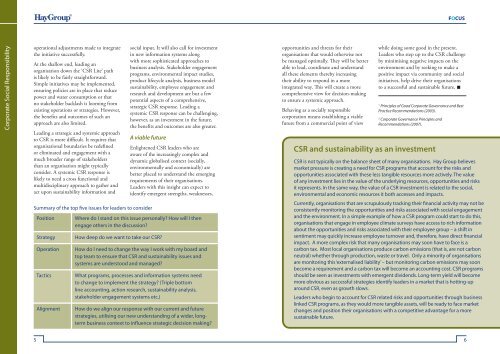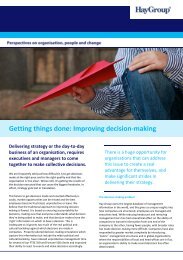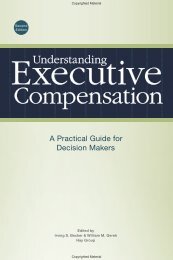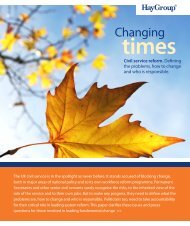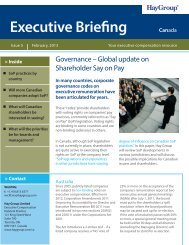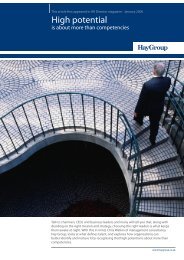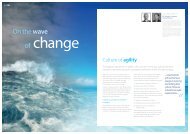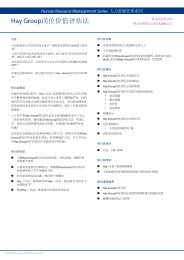Leading to a Sustainable Future - Hay Group
Leading to a Sustainable Future - Hay Group
Leading to a Sustainable Future - Hay Group
Create successful ePaper yourself
Turn your PDF publications into a flip-book with our unique Google optimized e-Paper software.
<strong>Hay</strong> <strong>Group</strong><br />
FOCUS<br />
Corporate Social Responsibility<br />
operational adjustments made <strong>to</strong> integrate<br />
the initiative successfully.<br />
At the shallow end, leading an<br />
organisation down the ‘CSR Lite’ path<br />
is likely <strong>to</strong> be fairly straightforward.<br />
Simple initiatives may be implemented,<br />
ensuring policies are in place that reduce<br />
power and water consumption or that<br />
no stakeholder backlash is looming from<br />
existing operations or strategies. However,<br />
the benefits and outcomes of such an<br />
approach are also limited.<br />
<strong>Leading</strong> a strategic and systemic approach<br />
<strong>to</strong> CSR is more difficult. It requires that<br />
organisational boundaries be redefined<br />
or eliminated and engagement with a<br />
much broader range of stakeholders<br />
than an organisation might typically<br />
consider. A systemic CSR response is<br />
likely <strong>to</strong> need a cross functional and<br />
multidisciplinary approach <strong>to</strong> gather and<br />
act upon sustainability information and<br />
Position<br />
Strategy<br />
Operation<br />
social input. It will also call for investment<br />
in new information systems along<br />
with more sophisticated approaches <strong>to</strong><br />
business analysis. Stakeholder engagement<br />
programs, environmental impact studies,<br />
product lifecycle analysis, business model<br />
sustainability, employee engagement and<br />
research and development are but a few<br />
potential aspects of a comprehensive,<br />
strategic CSR response. <strong>Leading</strong> a<br />
systemic CSR response can be challenging,<br />
however, as an investment in the future,<br />
the benefits and outcomes are also greater.<br />
A viable future<br />
Summary of the <strong>to</strong>p five issues for leaders <strong>to</strong> consider<br />
Tactics<br />
Alignment<br />
Enlightened CSR leaders who are<br />
aware of the increasingly complex and<br />
dynamic globalised context (socially,<br />
environmentally and economically) are<br />
better placed <strong>to</strong> understand the emerging<br />
requirements of their organisations.<br />
Leaders with this insight can expect <strong>to</strong><br />
identify emergent strengths, weaknesses,<br />
Where do I stand on this issue personally? How will I then<br />
engage others in the discussion?<br />
How deep do we want <strong>to</strong> take our CSR?<br />
How do I need <strong>to</strong> change the way I work with my board and<br />
<strong>to</strong>p team <strong>to</strong> ensure that CSR and sustainability issues and<br />
systems are unders<strong>to</strong>od and managed?<br />
What programs, processes and information systems need<br />
<strong>to</strong> change <strong>to</strong> implement the strategy? (Triple bot<strong>to</strong>m<br />
line accounting, action research, sustainability analysis,<br />
stakeholder engagement systems etc.)<br />
How do we align our response with our current and future<br />
strategies, utilising our new understanding of a wider, longterm<br />
business context <strong>to</strong> influence strategic decision making?<br />
opportunities and threats for their<br />
organisations that would otherwise not<br />
be managed optimally. They will be better<br />
able <strong>to</strong> lead, coordinate and understand<br />
all these elements thereby increasing<br />
their ability <strong>to</strong> respond in a more<br />
integrated way. This will create a more<br />
comprehensive view for decision-making<br />
<strong>to</strong> ensure a systemic approach.<br />
Behaving as a socially responsible<br />
corporation means establishing a viable<br />
future from a commercial point of view<br />
while doing some good in the present.<br />
Leaders who step up <strong>to</strong> the CSR challenge<br />
by minimising negative impacts on the<br />
environment and by seeking <strong>to</strong> make a<br />
positive impact via community and social<br />
initiatives, help drive their organisations<br />
<strong>to</strong> a successful and sustainable future. •<br />
1<br />
Principles of Good Corporate Governance and Best<br />
Practice Recommendations (2003).<br />
2<br />
Corporate Governance Principles and<br />
Recommendations (2007).<br />
CSR and sustainability as an investment<br />
CSR is not typically on the balance sheet of many organisations. <strong>Hay</strong> <strong>Group</strong> believes<br />
market pressure is creating a need for CSR programs that account for the risks and<br />
opportunities associated with these less tangible resources more actively. The value<br />
of any investment lies in the value of the underlying resources, opportunities and risks<br />
it represents. In the same way, the value of a CSR investment is related <strong>to</strong> the social,<br />
environmental and economic resources it both accesses and impacts.<br />
Currently, organisations that are scrupulously tracking their financial activity may not be<br />
consistently moni<strong>to</strong>ring the opportunities and risks associated with social engagement<br />
and the environment. In a simple example of how a CSR program could start <strong>to</strong> do this,<br />
organisations that engage in employee climate surveys have access <strong>to</strong> rich information<br />
about the opportunities and risks associated with their employee group – a shift in<br />
sentiment may quickly increase employee turnover and, therefore, have direct financial<br />
impact. A more complex risk that many organisations may soon have <strong>to</strong> face is a<br />
carbon tax. Most local organisations produce carbon emissions (that is, are not carbon<br />
neutral) whether through production, waste or travel. Only a minority of organisations<br />
are moni<strong>to</strong>ring this ‘externalised liability’ – but moni<strong>to</strong>ring carbon emissions may soon<br />
become a requirement and a carbon tax will become an accounting cost. CSR programs<br />
should be seen as investments with emergent dividends. Long-term yield will become<br />
more obvious as successful strategies identify leaders in a market that is hotting-up<br />
around CSR, even as growth slows.<br />
Leaders who begin <strong>to</strong> account for CSR related risks and opportunities through business<br />
linked CSR programs, as they would more tangible assets, will be ready <strong>to</strong> face market<br />
changes and position their organisations with a competitive advantage for a more<br />
sustainable future.<br />
560<br />
616


